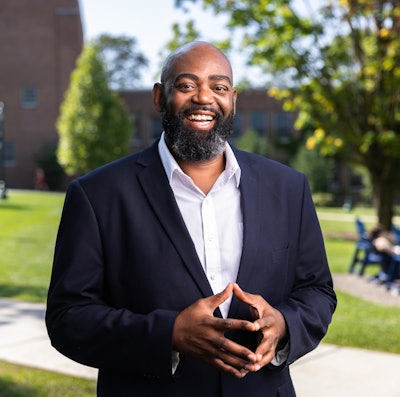 Clifton H. Harcum Sr.
Clifton H. Harcum Sr.
Addressing the mental health crisis through outdoor equity
The mental health crisis in higher education is a growing concern. Students of color, first-generation students, and those from low-income backgrounds often face unique stressors, including cultural isolation, financial burdens, and systemic barriers to success. While universities provide counseling services, there is increasing recognition that nature-based interventions can offer a powerful complement to traditional mental health support.
My work has focused on creating access to outdoor spaces for students who have historically been excluded from these environments. Through programs like alternative spring breaks, adventure retreats, and structured outdoor leadership experiences, we provide students with a therapeutic outlet that supports their mental, emotional, and physical well-being.
Many students in these programs have shared that the opportunity to disconnect from urban and academic stressors, engage in physical movement, and experience natural beauty has significantly improved their outlook on life. One participant in our Adirondack retreat expressed,
“This trip gave me a chance to breathe. I didn’t realize how much I needed it until I was here.”
For students from underrepresented communities, particularly those who face intergenerational stressors and daily microaggressions, these moments of respite are critical for mental resilience.
Creating space for healing: nature as a mental wellness strategy
Nature has long been recognized as a healing force, with research linking time spent outdoors to reduced stress, lower anxiety levels, and improved focus. However, systemic inequities have historically restricted access to outdoor recreation for marginalized groups. Many students from urban communities or culturally diverse backgrounds often do not grow up seeing themselves represented in outdoor spaces, leading to a perceived barrier to participation.
Through intentional programming, I have worked to break down these barriers by offering:
· Guided adventure experiences to introduce students to outdoor activities in a safe, welcoming environment.
· Mentorship and peer support to ensure students feel comfortable and included in outdoor spaces.
· Reflection and wellness workshops that connect nature experiences to mental and emotional well-being.
These structured approaches provide students with a sense of belonging in nature, reinforcing that the outdoors is for everyone.
Outdoor leadership and empowerment: building resilient, confident students
One of the most powerful aspects of outdoor recreation is its ability to build resilience, confidence, and self-efficacy. Many students enter these programs feeling apprehensive about trying new activities, particularly ones that challenge their physical and emotional comfort zones. However, by confronting and overcoming fears, whether through hiking, rafting, ziplining, or camping, students experience personal breakthroughs that extend far beyond the outdoor setting.
A key example of this transformation was seen in a group of students from historically underrepresented communities who participated in a whitewater rafting experience. Most had never been in a river before, and some had deep fears of water, yet through guided instruction and a supportive group dynamic, they faced their fears head-on. One student reflected,
“I’ve always doubted myself, but this showed me that I can push through fear and accomplish things I never thought possible.”
This lesson in perseverance directly translates into academic and career success. When students realize they can overcome physical and mental barriers in nature, they begin to approach challenges in their personal and academic lives with the same mindset.
Breaking the cycle: redefining rest and self-care for underrepresented students
Many students, especially those from historically marginalized backgrounds, internalize the pressure to constantly “prove” themselves in academic and professional spaces. Rest and leisure are often seen as luxuries rather than necessities. My goal has been to redefine the narrative around self-care, healing, and productivity, showing students that rest and renewal are essential components of success.
By incorporating DEI-centered outdoor recreation into university programming, we create opportunities for students to:
· Develop stress-management strategies in natural environments.
· Cultivate self-compassion through mindfulness and outdoor reflection exercises.
· Recognize that taking time for mental wellness is a form of resistance against burnout culture.
This shift in perspective is critical in combating burnout and mental health struggles, particularly for students who feel a constant need to excel under challenging circumstances.
A call to action: expanding outdoor access in higher education
Higher education institutions must recognize the role of outdoor access in mental health and DEI work. By prioritizing inclusive outdoor programming, universities can:
· Enhance mental health support beyond traditional counseling services.
· Foster leadership and confidence among underrepresented students.
· Create long-term solutions for breaking down barriers to outdoor access.
This is more than an equity issue; it is a mental health and student success imperative. The data and lived experiences of students affirm that when we create inclusive, healing-centered outdoor experiences, we empower students to thrive academically, emotionally, and personally.
By embracing the outdoors as a tool for well-being, leadership, and DEI advancement, we can redefine student success and provide underrepresented students with the space to breathe, heal, and grow.
This vision for outdoor equity and student mental wellness is not just theoretical, it is a proven, impactful solution that deserves greater attention in higher education. My hope is that more institutions will invest in nature-based, DEI-centered wellness initiatives, ensuring that all students, regardless of background, have access to the transformative power of the outdoors.
Clifton H. Harcum Sr. is the director of the Office for Multicultural Affairs at the State University of New York College (SUNY) at Geneseo.



















